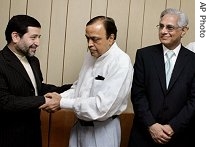2007年VOA标准英语-India, Pakistan and Iran Close To Gas Pipeline(在线收听)
New Delhi
29 June 2007
India says it is close to finalizing a deal to transport natural gas from Iran to India via Pakistan. As Anjana Pasricha reports from New Delhi, officials from the three countries have held talks in the Indian capital on the $7 billion project, which has been opposed by the United States.
 |
| Indian petroleum minister Murli Deora (center) shakes hands with Iran's special representative of Ministry of Oil Ghanimi Fard (l) before the start of a meeting, in New Delhi, 29 Jun 2007 |
The Indian minister spoke to reporters in New Delhi after officials from the three countries held talks on issues such as price mechanisms and transit fees for the $7 billion pipeline.
"I am very glad that they have reached to a great extent on all the sides agreements…maybe small things are still pending," he said.
Indian officials say an Iranian demand to revise the price of natural gas every three years is still to be negotiated. Another pending issue is the transit fee that Pakistan will receive for allowing the flow of gas to India.
Indian officials say ministers from the three countries are expected to meet next month, first in Pakistan and then in Iran, to hammer out the final details.
The 2,600 kilometer pipeline has been billed as a "peace pipeline." It will initially carry around 60 million cubic meters of gas per day starting in 2011 to both India and Pakistan.
India and Pakistan are pressing ahead with the pipeline deal despite strong opposition from the United States, which wants them to abandon the project. Washington feels the mammoth project will undermine its campaign to isolate Tehran, which it accuses of having a clandestine nuclear weapons program.
India and Pakistan, however, say they want to ensure fuel supplies for their energy-hungry economies. They also say the project will strengthen regional cooperation.
Bharat Karnad, a security analyst at the independent Center for Policy Research in New Delhi, says the project has significant benefits for both India and Pakistan.
"The fact of the matter is both countries are enormously energy-starved, so a proximal energy source that you are getting at a reasonable economic cost is hard to resist for either Pakistan or India," said Karnad. "And the fact also is …Iran is a factor in the stability of the region, so you cannot afford to in a sense to make a pariah out of Iran."
Negotiations on the project began in 1994 but were stalled for years as India expressed concern over the safety of the pipeline that would run through Pakistan, its rival for decades. But the project got fresh momentum after tensions eased between the South Asian neighbors following a peace process that began in 2004.